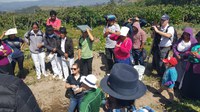NDSU Students, Faculty Visit Ag Research and Extension in Ecuador
(Click the image below to view a high-resolution image that can be downloaded)
Some students and faculty from North Dakota State University’s College of Agriculture, Food Systems, and Natural Resources have a better appreciation for agriculture, soils and the Extension Service after a recent trip to Ecuador.
The eight students and four faculty members spent their spring break visiting agricultural research and Extension activities in Ecuador as part of a special topics course that Tom DeSutter, an associate professor in NDSU’s Soil Science Department, organized.
“The purpose of this course was to give students a more global perspective of agriculture and soils than we can offer in and around Fargo,” DeSutter says. “Ecuador was ideal for this course due the immense variability in soils and environments within a relatively small geographic area.”
During the week, participants visited a research station at an elevation of more than 10,000 feet near Quito and another in the Amazon basin at an elevation of less than 1,000 feet.
“Similarly, we saw deep, rich volcanic soils with nearly 10 percent organic matter and highly weathered ‘red’ soils with less than half a percent of organic matter,” DeSutter says. “In addition to potatoes, corn and beans, the dominate crops in the highlands, participants also were exposed to new crops and fruits.”
The diversity of fruits was amazing, according to plant sciences student Melissa Geiszler.
“There were many fruits that we had never heard of or read about that we were able to taste and that were being conserved in the germplasm collection at the research center in the Amazon that we visited,” she says.
In addition, the group visited farmers and learned about local farming practices and production constraints.
“Farms are very small, compared to those in North Dakota, and although farmers in Ecuador use little mechanization, they face many of the same agronomic challenges that farmers face in the U.S., only on a smaller scale,” says Samantha Croat, a graduate student studying soil science.
“And like farmers here in North Dakota, they are passionate about their vocation and were keen to learn ways that they might improve their farm’s profitability,” she adds.
As part of the course, the students provided a half-day training to about 45 farmers from the village they visited.
“This training was the highlight of the trip,” says J Stanley, a Ph.D. student in plant sciences. “Not only did we learn more by preparing these presentations, we were able to better connect with the farmers and better understand their information needs than by just visiting their farms and asking them questions.”
The participants were highly engaged in the training and were appreciative of what they learned, notes NDSU Extension agronomist Hans Kandel, who was part of the group.
“This visit really impressed upon me the value of a functional Extension Service,” he says. “Reliable, research-based information is critical to improving agricultural production, and it was obvious that information on new varieties and production techniques was not getting to the farmers in the areas we visited.”
Other faculty who accompanied the students were soil scientist Caley Gasch and Extension agronomist Joel Ransom. The faculty also provided input in their areas of expertise.
NDSU Agriculture Communication - April 3, 2018
| Source: | Joel Ransom, 701-231-7405, joel.ransom@ndsu.edu |
|---|---|
| Editor: | Ellen Crawford, 701-231-5391, ellen.crawford@ndsu.edu |


